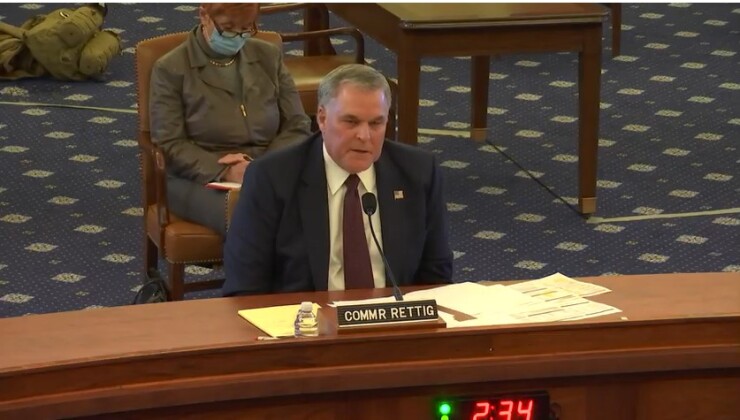The Internal Revenue Service and its partners in state tax authorities and the tax preparation industry are teaming up this week on a special campaign to highlight the dangers of tax scams and identity theft at this time of year.
The IRS and its Security Summit partners have dubbed this week National Tax Security Week. They want taxpayers and tax professionals to beware of tax scams revolving around the confluence of the holiday shopping season, the upcoming tax season and the ongoing COVID-19 pandemic. They believe that combination of events creates extra opportunities for criminals to steal sensitive personal or finance information. That means taxpayers should take extra care while shopping online or viewing emails and text messages.
"Don’t let this be the most wonderful time of the year for identity thieves,” said IRS Commissioner Chuck Rettig in a statement Monday. “The approach of the holidays and tax season increases risk for taxpayers and opportunities for criminals. We urge people to be extra careful with their personal and financial information during this period while shopping online or getting suspicious emails or text. Taking a few simple steps can keep people from becoming victims of identity theft and protect their sensitive personal information needed for tax returns and refunds.”

To help taxpayers and tax pros, the Security Summit listed 10 basic steps everybody should remember during the holidays and as the 2022 tax season approaches:
- Don't forget to use security software for computers, tablets and mobile phones — and keep it updated. Protect electronic devices of family members, especially teens and young children.
- Make sure anti-virus software for computers has a feature to stop malware, and there is a firewall enabled that can prevent intrusions.
- Phishing scams — like imposter emails, calls and texts — are the No. 1 way thieves steal personal data. Don't open links or attachments on suspicious emails. This year, fraud scams related to COVID-19, Economic Impact Payments and other tax law changes are common.
- Use strong and unique passwords for online accounts. Use a phrase or series of words that can be easily remembered or use a password manager.
- Use multi-factor authentication whenever possible. Many email providers and social media sites offer this feature. It helps prevent thieves from easily hacking accounts.
- Shop at sites where the web address begins with "https" — the "s" is for secure communications over the computer network. Also, look for the “padlock” icon in the browser window.
- Don't shop on unsecured public Wi-Fi in places like a mall. Remember, thieves can eavesdrop.
- At home, secure home Wi-Fi with a password. With more homes connected to the web, secured systems become more important, from wireless printers, wireless door locks to wireless thermometers. These can be access points for identity thieves.
- Back up files on computers and mobile phones. A cloud service or an external hard drive can be used to copy information from computers or phones — providing an important place to recover financial or tax data.
- Working from home? Consider creating a virtual private network to securely connect to your workplace.
The IRS Criminal Investigation division has been stepping up its efforts to combat tax crimes, particularly those related to cryptocurrency. Earlier this month, IRS CI released its
IRS CI’s Questionable Refund Program identifies fraudulent claims for tax refunds. Typically, the schemes involve individuals filing multiple fraudulent tax returns using the personally identifiable information of individuals, either knowingly or unknowingly, to facilitate the scheme. A significant number of the investigations are also considered to be identity theft investigations.
The ongoing pandemic may also lead to tax fraud and identity theft schemes. “There are several frauds under that COVID fraud umbrella,” said IRS CI chief Jim Lee during a conference call with reporters earlier this month. “In fiscal year 2021, we’ve initiated 384 COVID fraud cases, and we’ve seen around 206 indictments. There’s not a week that goes by these days where I’m not seeing somebody being charged or indicted for COVID fraud crimes. In that arena, as the chief, I’m continuing to stress the most significant COVID fraud investigations and, more importantly, work with the U.S. Attorney’s office on timely prosecutions so we have the biggest deterrent impact right now.”
During the pandemic, the IRS said there continue to be numerous scams related to COVID-19. These can be attempts to gain sensitive personal or financial information. The Federal Trade Commission also has issued
The IRS and its Security Summit partners are also continuing to see identity thieves trying to appear like they are government agencies and others in the tax community by emailing or texting about tax refunds, stimulus payments or other items. The IRS will not call or send unexpected texts or emails about things like refunds. More information about these scams is available at
The IRS and its Security Summit partners are also sharing YouTube videos on security steps for taxpayers, such as
Employers can also share and download
The IRS and its Security Summit partners are also reminding people about the security vulnerabilities in mobile phones. Cyber thieves have become more skilled at compromising mobile phones. Phone users also are more liable to open a scam email from their phone than from their computer.
Taxpayers can check out security recommendations for their specific mobile phone by reviewing the Federal Communications Commission's





